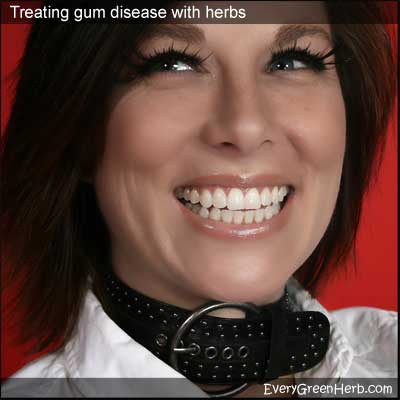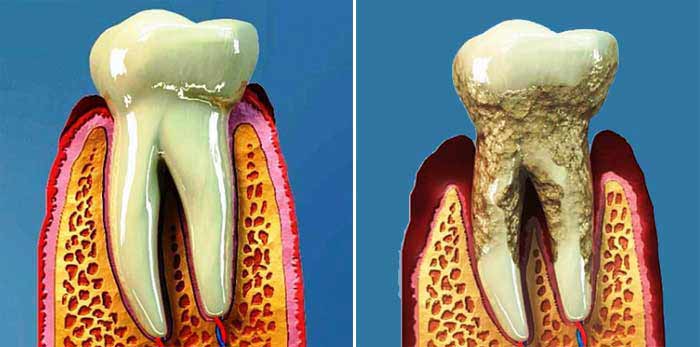Gum disease herbs and remedies

Using myrrh in the mouth and on the gums
Myrrh is especially useful in the treatment of gum disease. If gum disease is diagnosed, gently rub the gums with myrrh powder or sprinkle it on your toothpaste before brushing.
Myrrh is a resin that comes in several forms including resin, powder, and essential oil.
To control infection and stop bleeding whenever you have a mouth injury, such as when you bite your tongue, apply myrrh powder directly to sore area. Myrrh is my go to natural treatment for most types of gum problems.
A drop of frankincense or myrrh essential oil can also help. Apply to area with cotton swab.
I use myrrh powder sprinkled on my toothpaste at least once a week to keep my mouth, gums, and teeth in good shape. It really makes my whole mouth feel refreshed and clean.

Other herbs that can heal gum disease
No myrrh powder or frankincense available? Fresh strawberries, baking soda, or sage leaves can help heal gum disease. Just rub a strawberry or sage leaf on your gums, and add baking soda to your toothpaste.
A variety of herbs fight gum disease.
St. John's Wort, peppermint, chamomile, yellowroot and ginseng tea can also do the job.
Other remedies include applications of diluted tea tree essential oil, witch hazel, licorice root extract, calendula extract, aloe vera juice, turmeric, green drinks (containing chlorophyll), pure cranberry juice, echinacea extract, propolis tincture, diluted clove essential oil, diluted eucalyptus essential oil, or grapefruit seed extract.
Apply treatments three or four times a day. Discontinue if symptoms worsen or irritation develops.
Science, herbs, and mouth disease
Periodontal disease is very common, affecting around 90% of the human population.
In India, herbs are often used to effectively treat gum disease and other health problems. People turn to natural remedies for many reasons, including their wide range of medicinal activity, lower costs, and absence of serious side effects.
Herbs with strong antioxidant properties are most effective against gum disease. The herbs work by reducing oxidative stress in the cells. They sequester metal ions and prevent harmful oxidation.
Strong antioxidants can be found in everything from vitamin C to wheat grass. Some of the most potent to use when fighting gum disease include the following:
- Green tea
- Ginkgo biloba
- Guava
The antioxidant, antimicrobial, and anti-inflammatory properties in these herbs suppress alveolar bone loss and help gums to heal faster.
Herbs for periodontal disease
Tests show many herbs are useful when treating periodontal disease. Here are some of the most widely used:
- Acacia catechu (kin to mimosa)
- Aloe vera
- Azadirachta indica (neem tree)
- Glycyrrhiza glabra (licorice)
- Cinnamomum zeylanicum
- Allium sativum (garlic)
- bee propolis
- Mikania laevigata (guaco)
- Droserapeltata (pale sundew)
- Helichrysumitalicum (curry plant)
- Coptidis rhizome (contains berberine like yellowroot)
- Piper cubeba (Java pepper)
- Tea tree oil
Don't forget turmeric, babul, lemongrass, tulsi, and essential oils!
Turmeric is also a natural remedy for gum disease. Phytochemicals in turmeric work like natural antibiotics to heal and protect the teeth and tissues. It is especially useful after root planning and scaling.
Babul (Aracia Arabica) is used in gel and powder forms to kill harmful bacteria in the mouth, and to stop bleeding from the gums. It is known to protect from gingivitis, and early plaque formation on the teeth.
Lemongrass is another herb mentioned in scientific studies. It fights gingivitis and reduces plaque build-up.
Tulsi (Ocimum sanctum), Coriandrum sativum, Quercus Brantii, and Arak tree (Salvadora persica) are also helpful.
Aromatherapy and essential oils are also effective against gum disease.
Clove oil, eucalyptus oil, lemongrass oil, and orange oil all are good ones to try.
Clove is also a natural remedy for toothache. A drop on a bad tooth can help until you can see a dentist.
Besides the herbs above, other herbal products are also undergoing clinical trials.
Herbal remedies and lifestyle changes can stop gum disease.
Gum diseases like pyorrhea and gingivitis are common in today's society because of all the sugar that is consumed on a daily basis. Gum disease is usually a progressive disorder affecting the gums and underlying bone structure.
Gum diseases can be successfully treated or avoided with myrrh, frankincense, herbal teas, good hygiene habits, healthy diet, and regular dental checkups.
Keeping teeth clean is important to gum health.
Causes of gum disease include plaque and tarter build-up, nutritional deficiencies, allergies, lack of fresh food, too much meat, too much refined food, or too much sugar in the diet, and poor brushing and flossing habits.
Everyone should visit a dentist at least once a year. Getting the teeth cleaned by a professional is a must for removal of plaque and tarter build-up below the gum line.

Gum disease is not fun.
Symptoms of gum disease include red, swollen gums that bleed easily, chronic bad breath, loose or shifting teeth, receding gums, loss of teeth, changes in bite pattern, a bad taste in the mouth, and hot / cold sensitivity.
Improve gum health with good diet.
The best way to insure healthy gums is an improved diet. Eating lots of fresh, crunchy foods like celery, apples, cereal, seeds, and green salads which contain live enzymes can improve gum health. Live enzymes are essential for gum health.
Always chew food well and avoid acid forming foods like sugar, soft drinks, and refined foods.
When gum disease or mouth sores strike, natural remedies like myrrh work quickly to stop pain and protect from future problems.
Poor gum health? Quit smoking!
Another way to keep the mouth and gums healthy is to quit smoking. The chemicals that are present in tobacco smoke are corrosive and damaging.
Chewing tobacco also contributes to gum disease and tooth decay. Nicotine is an addictive, poisonous substance that should be avoided.
Other drugs, especially meth, can also damage the teeth and gums. Read more about overcoming addiction with herbs if you are addicted to tobacco or other substances.
Herbal tooth pastes are available at health food stores.
There are toothpastes on the market that contain frankincense and myrrh. The taste is not as sweet as common brands, but worth it to save your teeth. Use daily to heal the gums and to protect your teeth from harmful microbes.
Most commercial toothpastes contain sodium lauryl sulfate. It is added to increase foaming while brushing. This ingredient causes dry mouth which can lead to tooth decay. Look for natural toothpastes in health food stores that do not contain sodium lauryl sulfate.
For gum health brush and floss regularly
Brushing lightly after every meal is recommended to avoid gum disease and cavities. Everyone should brush once or twice a day, but not so often that gums are irritated. Flossing is also very important to mouth and gum health, especially at bed time.
Do not get rough with your teeth and gums. Brush in gentle circular motions and floss with a light hand. Replace your toothbrush every 3 months and make sure the bristles are not too hard or they may injure your gums.
Rinsing with salt water can also help keep gums healthy.
Sometimes dietary supplements are needed to protect and heal the gums. Minerals and vitamins (especially calcium, vitamin C, and vitamin E), and antioxidants like CoQ10 are often taken to promote gum health.
*Overuse of myrrh and frankincense can cause diarrhea, irritation of the kidneys, headache, and other problems. Do not use myrrh or frankincense during pregnancy. Keep all essential oils away from the eyes. Do not take essential oils internally without consulting a qualified professional.
Always dilute essential oils with good carrier oil and test on small area of skin before use. Always consult with a healthcare professional before using any herbal remedy especially if pregnant, nursing, or taking other medicines.
Sources:
https://www.ncbi.nlm.nih.gov/pmc/articles/PMC4805154/
https://www.ncbi.nlm.nih.gov/pmc/articles/PMC6525324/
Blessings to you and yours!
Thanks so much for reading my blog. Jan.

*Note - the information on this website has not been evaluated by the Food and Drug Administration.
© 2005-2024 website design and content by Janice Boling